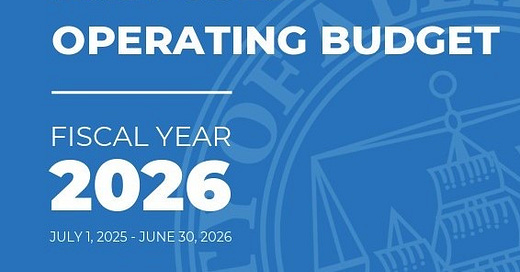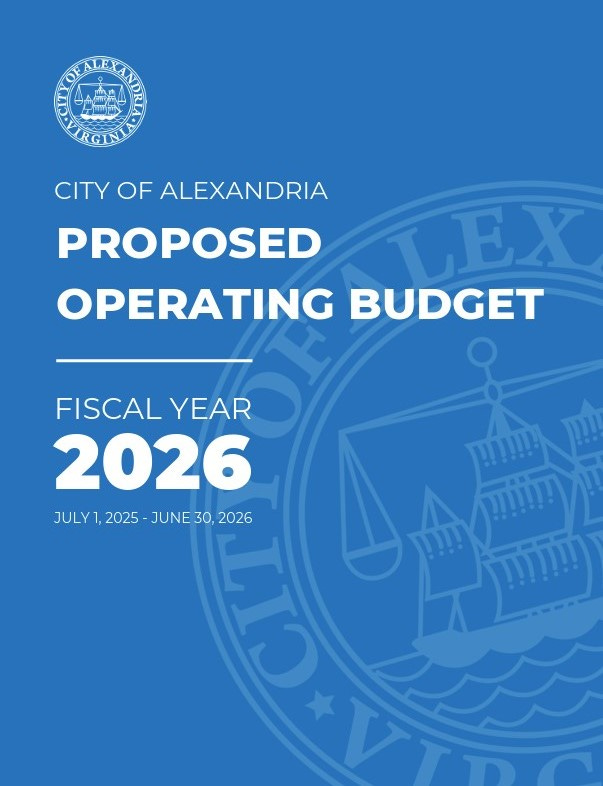Alexandria’s FY 2026 operating and capital budgets are scheduled for adoption on April 30 so there is still time to consider this year’s budget themes and realities.
Budget work sessions generally show the city’s elected officials as highly dedicated people focused on the common good, not on politics or ideology. We should be grateful because if to govern is necessarily to choose, budget debates are where the choices are considered and made.
In public service organizations like the city government and the Alexandria City Public Schools, every budget choice affects every other budget choice. The City Council looks at the budget with a wide-angle lens; the School Board’s lens is narrower. These differing perspectives, and the Council having custody of the only checkbook, make disagreements inevitable.
ACPS consumes a significant portion of the city’s budget. For FY 2026, $281 million is proposed for school operations and $210 million is proposed for school capital projects.
Introducing more joint operations, or shared city and ACPS services, is a fond hope for some officeholders evaluating this year’s budget. Ideas such as organizing student transportation partially through DASH to reduce reliance on ACPS busses, or combining city and ACPS employees in a single health insurance risk pool, should be welcomed and explored. Unfortunately, staff responses at the March 5 Council-School Board work session suggested that shared operation proposals create modest, if any, savings.
Imagining that circumstances could be other than as they are does not resolve current budget decisions. For example, city elected officials who suggest that Northern Virginia jurisdictions try to persuade the Virginia state government to make direct grants to localities to relieve their budget problems are hoping for a revolution, or at least a significant change in how Virginia has historically operated.
This year’s budget discussions show that it will be impossible to win an argument (in the sense of changing minds) that involves numbers with the Mayor and Council. Their command of the financial facts, including the potential impacts of federal government contraction, is impressive.
Moreover, comparisons with other jurisdictions, for example, ACPS’ requested funding increases as a percentage of the city’s total budget, are of limited utility. Any comparison of Alexandria’s metrics to those of Fairfax, Loudoun or Prince William counties is immediately suspect because of the discrepancies in size, resources, and populations served.
Residents who testify at Council budget hearings seeking, for example, full funding of the George Washington’s Birthday Parade, are doing the same thing the School Board does: advocating for budget allocations to support values they believe in.
Budget discussions now and those that occurred when I was on the Board are alike in that penalizing ACPS through the budget for its shortcomings is the ultimate self-inflicted wound for Alexandria.
A major difference is that now ACPS is expected to successfully address social pathologies-fentanyl, cellphone and other screens, the pandemic-that impact young people more negatively than anything in prior years. A relentless focus on instruction, or what goes on in the classroom, remains essential for ACPS, but things are more complex now. The focus on instruction cannot ignore other imperatives, for example, student wellness.
The budget add/delete process, scheduled for this month, in which officeholders propose budget adjustments often reveals a paradox. People run for office on big ideas: to enhance the city’s quality of life, to improve public education, et cetera, and end up in budget debates on granular issues that involve modest amounts of money.
The Council-School Board work session was notable for calls from several participants for increased collaboration, for example “a way forward together on a new middle school.” One officeholder called for a “tone change,” adding that “working together should not be optional.”
At the work session, some officials expressed an interest in joint Council-Board long term planning. However, the City Manager pointed out that long term plans can rapidly become obsolete or overtaken by events.
The need to work together in a budget season of guaranteed disagreement, and even conflict, was revealed by the personal commitments described by each Councilor and Board member during the Council’s Feb. 1 retreat. One after another, the city’s elected officials committed to communicating with each other. One official raised the stakes by pledging to talk every month with their liaison from the other body.
Some of the city’s officeholders may read this. If so, please pick up the phone and call your counterpart on the other elected body. The stakes are high.
The writer is a former lawyer, member of the Alexandria School Board from 1997 to 2006, and English teacher from 2007 to 2021 at T.C. Williams High School, now Alexandria City High School. He can be reached at aboutalexandria@gmail.com and free subscriptions to his newsletter are available at https://aboutalexandria.substack.com.
Thanks for reading About Alexandria!
Subscribe for free to receive new posts.
.




